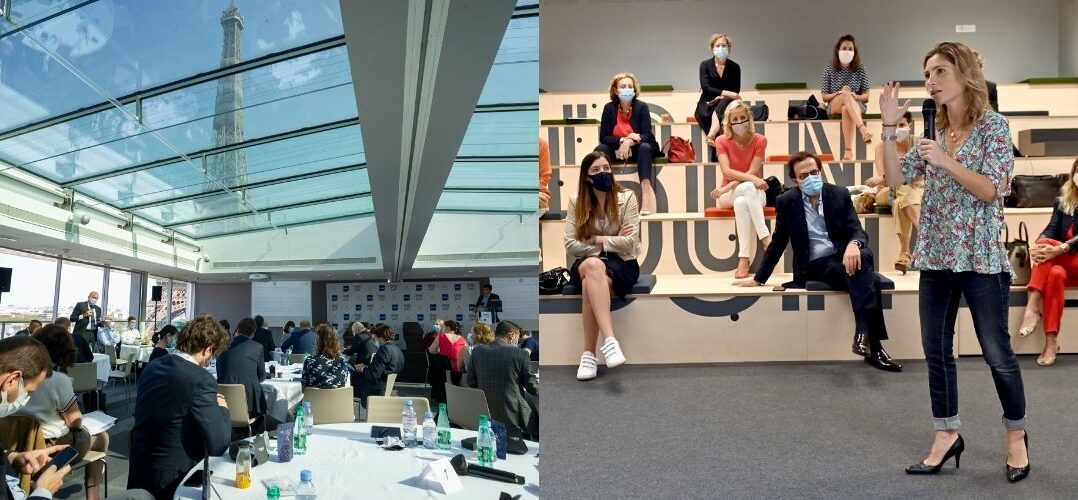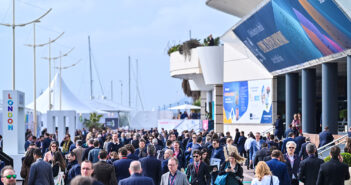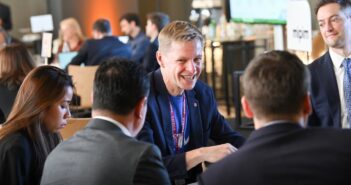The fourth and final day of Paris Real Estate Week culminated in two dynamic events addressing key industry themes.
The Hospitality Summit, sponsored by Accor and in partnership with MKG Consulting, enabled business leaders to exchange plans for reinventing the sector. Meanwhile, the Gend’Her Breakfast addressed real estate gender balance, led by philosopher Julia de Funes.
The Hospitality Summit kicked off with a welcome from Reed MIDEM’s Ronan Vaspart and Vanguélis Panayotis, CEO of MKG Group, before Dr. Holger Schmieding, chief economist of Berenberg, delivered his keynote analysing the outlook.
Said Schmieding: « We seem to be on track for a tick-shaped recovery. Shops and factories have already resumed, further business investment and fiscal stimulus will follow. The 4th stage will bring us back to pre-pandemic levels of economic activity by early 2022 for the likes of France, Germany and the US, while Italy and the UK will take another year, due to economic weakness and the impacts of Brexit respectively. »
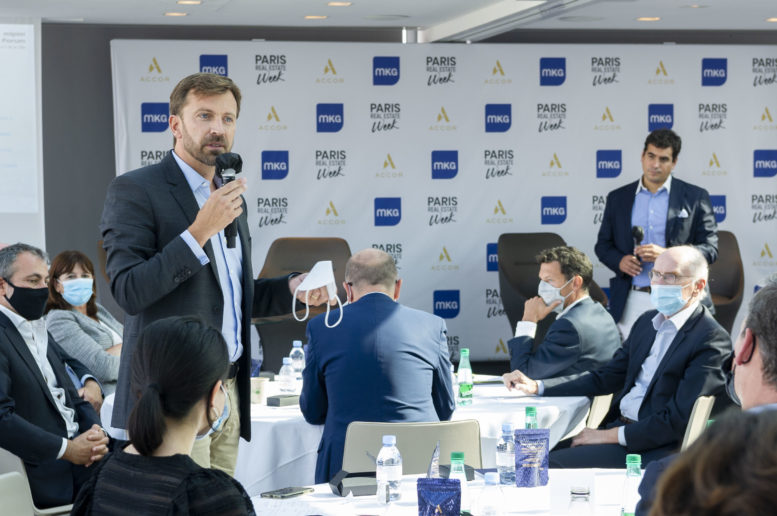
Photo: Eric Megret/Image & Co
The roundtable stage of the summit saw delegates divided across 10 tables to discuss 10 hot hospitality topics. After chatting for an hour, the chair of each table reported back with some fascinating insights. Themes ranging from cashflow streams to co-branding, holiday types and the relationship of hotels to their cities all came under the spotlight.
Arnoud Vink, Vice President of Development at Accor, reported back from a roundtable exploring « how to diversify cashflow streams ». « From co-working facilities to Zoom rooms, student dorms to staycation options, hotels should try to attract local customers, » he said.
« Travel has changed and travellers have changed. People want the real deal when they visit an iconic city; they don’t look at star rating, they want the local experience, » suggested Alexander Schneider, President, Nikki Beach Hotels & Resorts, on the theme of « how hospitality trends contribute to the attractiveness of cities ».
On the outlook for MICE hotels, Philippe Rossini, Portfolio Manager – Hospitality at Swiss Life Asset Managers France summarised: « Events are going to be smaller and more regional in the future, although tech will allow more people to join. Rather than converting redundant space into rooms, focus on offering great tech. »
MKG’s Panayotis then discussed hospitality investment trends with Giorgio Manenti, Managing Director of Eastdil Secured. « Year-on-year, investment in Europe has fallen from €20 bn to just €5 bn so far in 2020. And those deals were mostly agreed pre-Covid, » Manenti noted. However, he indicated that some markets – including Germany and France – were looking more robust, although the debt markets showed warning signs in the UK.
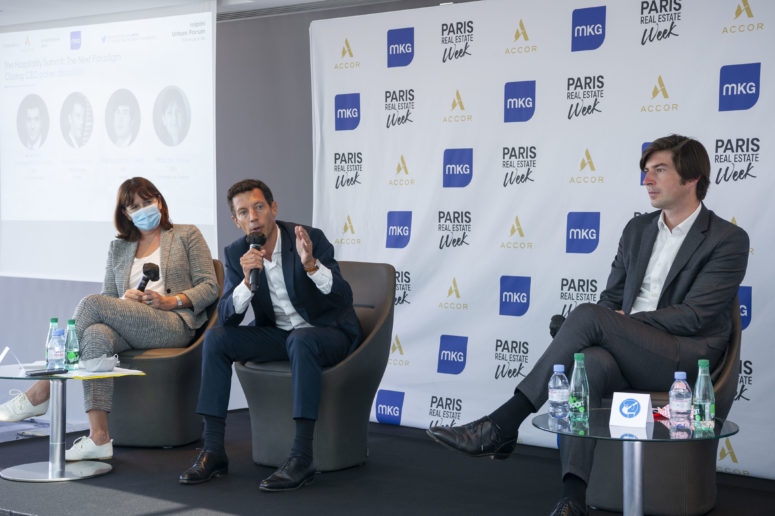
Photo: Eric Megret/Image & Co
The summit wrapped up with a CEO panel, featuring three leaders from the world of hospitality. Said Pascale Roque, CEO of Tourisme de Atream: « We want to work with entrepreneurs who have transformation projects in the works, and focus more on direct relationships with customers. Forging the right partnerships is key. »
Added Pablo Nakhlé Cerruti, CEO of Viparis: « We’d like to provide more diversity in our venues. Conference guests want to come for work but leave with a sense of having experienced Paris, despite only spending a few days in the city. »
Concluded Franck Gervais, CEO Europe of Accor: « A lot of people talk about agility, but they don’t really know what it is. Our hotels are now becoming social hubs, F&B and entertainment are becoming more important. We have to serve people who want to find positive places where to spend time. »
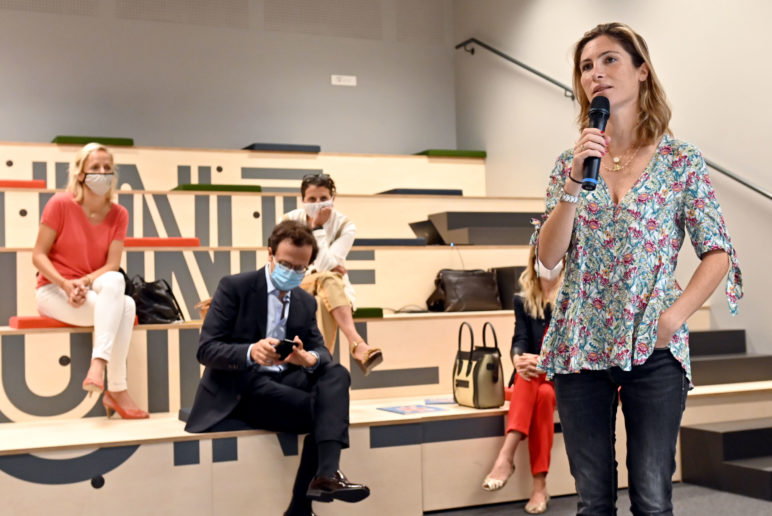
Photo: Seb D’Halloy, Image & Co
The Gend’Her Breakfast was the latest in a series of events co-organised by MIPIM, Business Immo and KMPG, which aim to address issues around gender balance in the real estate sector. Today’s session, held at Covivio’s Wellio Montmartre coworking space, welcomed Julia de Funès (above), a French philosopher specialised in work-related topics. She began by discussing the impact of Covid-19 on the workplace.
« Critics of home working (WFH) said we’d work less effectively. I disagree, » de Funès began. « We can still go to the office a few days a week. Besides, In open space offices, we’re too afraid to bother our neighbours, so instead of talking to each other, we send emails. It’s like WFH at the office! Whereas when you don’t see colleagues all the time, you work more effectively when you are together. Like marriage, in a way: absence makes the heart grow fonder! »
« Studies show that people work more effectively at home, » continued de Funès, « notably because there’s less theatrality, or representation. However, it’s harder to balance personal and work time when home chores and work are all bundled together. » Therein lies the key challenge for women at work, she said.
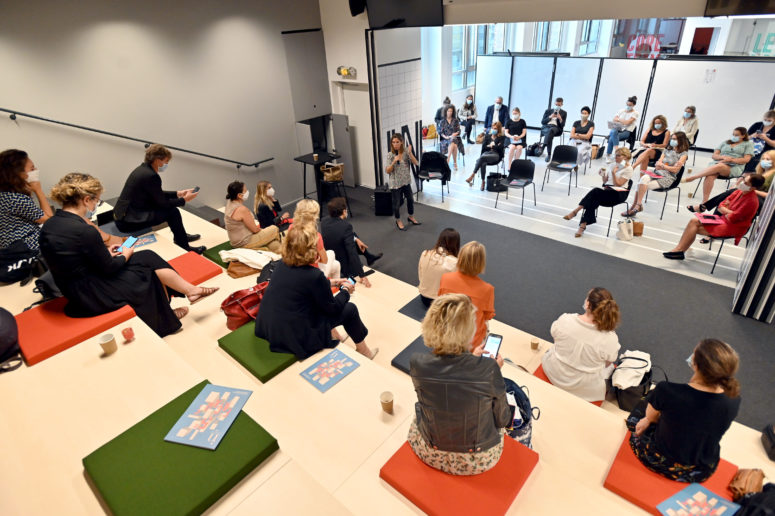
Photo: Seb D’Halloy, Image & Co
« Human conscience is always double; authenticity is accepting that double nature, as Sartre said. And yet we always want to fully play all of our different roles: teacher, mother, lover… That’s a mistake. During confinement, that made us panic (as women): trying to be everything at once. Today, women’s real challenge is freedom, not equality. What Nietzsche called ‘will to power’ is the most difficult thing for women to do today. Liberation can only happen if women dare to be themselves, rather than trying to fit into whatever mould. »
As for concrete solutions for gender balance at work, for de Funès, « quotas can be necessary to open some doors, but once we have, you get people who are in their position thanks to quotas, not thanks to their performance levels. » Equal salaries, said de Funès, are a key objective to aim for; but she also observed that « many women don’t want to go for top level jobs what with everything else they have to manage at home. » Not, she specified, because they choose to, but because roles are not always fairly distributed at home. « Women also tend to limit themselves, » she said. « In my domain, male (philosophers) publish new articles every day; I need a whole week to write one! »
Thank you for following Paris Real Estate Week! Catch up on all the key insights here…
